On June 9, 2006, an explosion on the beach near the Gaza Strip municipality of Beit Lahia killed eight Palestinians. At least thirty others were injured. The aftermath of the incident was captured on video and showed a distressed eleven-year-old girl, Huda Ghaliya, reacting to the loss of family members, most of whom were killed in the incident. The footage of Ghaliya, which received considerable media attention, was broadcast on news networks around the world, making her a symbol of Palestinian suffering. The German newspaper Süddeutsche Zeitung questioned the reliability of the video footage.

The State of Israel and the Republic of Turkey formally established diplomatic relations in March 1949. Less than a year after the Israeli Declaration of Independence, Turkey recognized Israeli sovereignty, making it the world's first Muslim-majority country to do so. Both countries gave high priority to bilateral cooperation in the areas of diplomacy and military/strategic ties, while sharing concerns with respect to the regional instabilities in the Middle East. In recent decades, particularly under Turkey's Erdoğan administration, the two countries' relationship with each other has deteriorated considerably. However, diplomatic ties were reinstated after a successful normalization initiative in mid-2022.
The 2006 shelling of Beit Hanoun by the Israeli Defence Force (IDF) happened on 8 November, when shells hit a row of houses in the Gaza Strip town of Beit Hanoun, killing at least 19 Palestinians and wounding more than 40. The shelling followed the IDF's withdrawal from the Gaza Strip in completion of a week-long operation codenamed Operation "Autumn Clouds", which the Israeli government stated had been intended to stop the Qassam rocket attacks on Israeli civilians by Palestinian militants. The Israeli government apologized and attributed the incident to a technical malfunction.

The 2006 Gaza–Israel conflict, known in Israel as Operation Summer Rains, was a series of battles between Palestinian militants and the Israel Defense Forces (IDF) during summer 2006, prompted by the capture of Israeli soldier Gilad Shalit by Palestinian militants on 25 June 2006. Large-scale conventional warfare occurred in the Gaza Strip, starting on 28 June 2006, which was the first major ground operation in the Gaza Strip since Israel's unilateral disengagement plan was implemented between August and September 2005.

Zalman Shoval is an Israeli banker, politician and diplomat. He is also active in Israel's economic life. He was the Israeli ambassador to the United States in the years 1990–1993 and 1998–2000, and an active member of the Knesset in the Rafi-State List, and the Likud party.

In 2008 the Israel Defense Forces launched Operation Hot Winter, also called Operation Warm Winter, in the Gaza Strip, starting on February 29, 2008 in response to Qassam rockets fired from the Strip by Hamas onto Israeli civilians. At least 112 Palestinian militants and civilians, along with three Israelis, were killed, and more than 150 Palestinians and seven Israelis were injured.
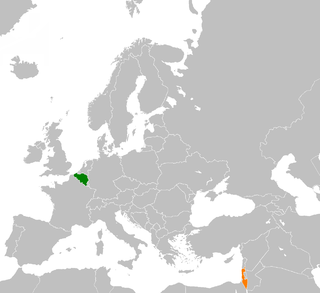
Belgium–Israel relations are the bilateral relations between Belgium and Israel. Belgium voted in favor of the United Nations Partition Plan for Palestine in 1947 and recognized the State of Israel on January 15, 1950. Belgium has an embassy in Tel Aviv, and Israel has an embassy in Brussels.

The 2010 Gaza clashes were military clashes in the Gaza Strip between Israeli forces and Palestinian armed groups that occurred in March 2010.
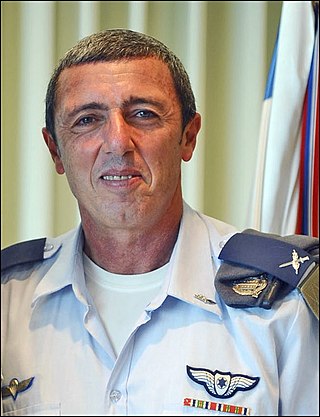
Rafael "Rafi" Peretz is an Israeli Orthodox rabbi and former politician. A former military officer and helicopter pilot who also served as the Chief Military Rabbi of the Israel Defense Forces, he was the leader of the Jewish Home party. Peretz was a member of the Knesset for the Yamina alliance until he separated from the faction in order to join the Netanyahu-led government.

Egypt–Palestine relations are the bilateral relations between the Arab Republic of Egypt and the State of Palestine. Egyptian President Gamal Abdel Nasser was a strong supporter of the Palestinian cause and he favored self-determination for the Palestinians. Although the Egyptian government has maintained a good relationship with Israel since the Camp David Accords, most Egyptians strongly resent Israel, and disapprove of the close relationship between the Israeli and Egyptian governments.
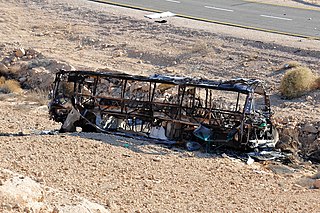
On August 18, 2011, a series of cross-border attacks with parallel attacks and mutual cover was carried out in southern Israel on Highway 12 near the Egyptian border by a squad of presumably twelve militants in four groups. The attacks occurred after Israel's interior security service Shin Bet had warned of an attack by militants in the region and Israeli troops had been stationed in the area. The militants first opened fire at an Egged No. 392 bus as it was traveling on Highway 12 in the Negev near Eilat. Several minutes later, a bomb was detonated next to an Israeli army patrol along Israel's border with Egypt. In a third attack, an anti-tank missile hit a private vehicle, killing four civilians. Eight Israelis – six civilians, one Yamam special unit police sniper and one Golani Brigade soldier—were killed in the multiple-stage attack. The Israel Defense Forces reported eight attackers killed, and Egyptian security forces reported killing another two.
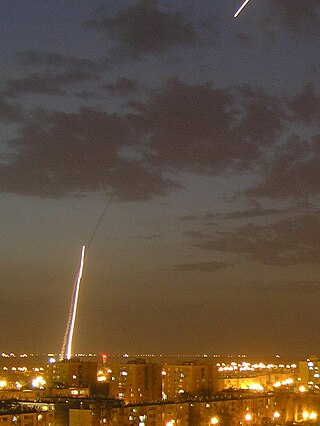
In November 2012, the Israel Defense Forces (IDF) launched Operation Pillar of Defense, which was an eight-day campaign in the Hamas-governed Gaza Strip, beginning on 14 November 2012 with the killing of Ahmed Jabari, chief of the Gaza military wing of Hamas, by an Israeli airstrike.

Eli Cohen is an Israeli politician. A member of the Knesset since 2015, he is currently the head of the Ministry of Energy. Cohen previously served as Minister of Foreign Affairs from 2022 to 2024. Cohen previously served as Minister of Intelligence (2020–2021) and Minister of the Economy and Industry (2017–2020).
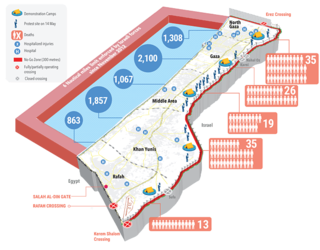
The 2018–2019 Gaza border protests, also known as the Great March of Return, were a series of demonstrations held each Friday in the Gaza Strip near the Gaza-Israel border from 30 March 2018 until 27 December 2019, in which Israeli forces killed a total of 223 Palestinians. The demonstrators demanded that the Palestinian refugees must be allowed to return to lands they were displaced from in what is now Israel. They protested against Israel's land, air and sea blockade of the Gaza Strip and the United States recognition of Jerusalem as capital of Israel.

Gaza-Israel clashes began on 11 November 2018, when a botched Israeli covert operation carried out in the Khan Yunis area of the southern Gaza Strip killed seven Palestinian militants and one Israeli soldier. Exchanges of fire lasted for two more days, until a cease fire was achieved with Egyptian mediation. Some minor incidents and protests followed some two weeks after the cease fire, with decreasing intensity.

A Gaza–Israel conflict escalation began on 3 May 2019 after two Israeli soldiers were injured by sniper fire from the Gaza Strip during the weekly protests at the Gaza–Israel border. In response, the Israeli Air Force carried out an airstrike, killing two Palestinians. Following this, hundreds of rockets were launched from Gaza at Israel, while the Israeli Air Force struck numerous targets within the Gaza Strip. In addition, Israel increased its troop presence near the Israel–Gaza barrier.
Events of the year 2023 in Israel.














